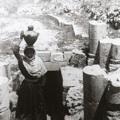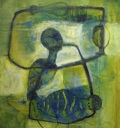

Lenten Studies - Week 2: The Woman at the Well
Reflecting on the Gospel story
The setting
This scene is set at Jacob’s well, the one that Jacob, his sons and his cattle drank from, which is situated near the field that Jacob gave to his son Joseph. Whoever owns the well is a keeper of life; whoever has access to the well has admittance to new life. Like pubs and coffee houses, wells were natural gathering places, where news would be exchanged and the latest gossip gathered; they were also associated with romantic relationships.
The power of witness
“Many Samaritans from that city believed in him because of the woman’s testimony.” (John 4:39)
The words ‘testimony’ and ‘witness’ are key terms in John’s Gospel, beginning with John the Baptist who is introduced as the one sent by God - “he came for testimony, to bear witness to the light, so that all might believe through him” (John 1:7)
In that sense John’s Gospel can be seen as a courtroom with the evangelist putting a case before the assembly “that you may come to believe that Jesus is the Messiah, the Son of God, and that through believing you may have life in his name”.
The evangelist calls a number of witnesses to the stand, John the Baptist being the first witness to testify. John is not the only witness called to give evidence in this courtroom. The woman of Samaria testifies from her own experience. She speaks out of the authority of her own experience: she is not sharing her thinking or her ideas, but her experience. To speak about Jesus she consults her own story, not a book, not a scholar and not a school of thought. The jury must decide whether she is worthy of belief and accept or reject her testimony. Evidence comes also from:

Jesus bears witness to what he knows and has seen (3:11)
The woman of Samaria witnesses to her own town (4:7-42)
The works that Jesus performs bear witness to him (5:36)
The Father bears witness to Jesus (5:37; 8:18)
The scriptures bear witness to Jesus (5:39)
Moses witnesses to Jesus in his writing (5:46)
Jesus can bear valid witness to himself (8:14)
The Spirit of truth will bear witness to Jesus (15:26)
The disciples are qualified to be witnesses to Jesus (15:27)
The evangelist himself bears witness to Jesus (19:35; 21:24)
The evangelist’s school or community of believers, in turn, bears its own witness (21:24)
The evangelist John is taking a mighty risk in presenting this woman as a witness - not only because across the ancient world the word of a woman was not accepted as valid testimony, but because the word of this particular woman, given her moral background, would not secure automatic respect from anyone. Yet the extraordinary thing is that the evangelist includes her in his gathering of witnesses, a measure of his confidence in a woman who has already won over a town by the strength of her testimony.
The woman’s testimony leads the townspeople to seek Jesus out at the well for themselves, which they do, and Jesus stays with them for two days. The townspeople experience Jesus for themselves and so they say to the woman: ―It is no longer because of what you said that we believe, for we have heard for ourselves, and we know that this is truly the Saviour of the world.‖ In their turn, the townspeople become witnesses. They can proclaim: What we have heard, what we have seen with our eyes, what we have looked at and touched with our hands, concerning the word of life—this life was revealed, and we have seen it and testify to it, and declare to you.”
Anyone who has experience can, if they reflect on it, become a witness. Those who had experience of new life in the Gospel converted their experience into a message. They described what happened: their experience became a story, opening up new possibilities for others. Their experience is not just a personal story of change; it leads them to make claims about Jesus. Given what happened to me, who then is he? What does my experience say about him?
John underlines the role of experience in understanding Jesus; the pastoral purpose of this is to bring people into a community of faith. Jesus shared his dreams with those who knew him, hoping their relationship with him would become Gospel. The Gospel begins when we have a living relationship with Jesus. It is thus that the Gospel is preached, thus the tradition is handed over, thus the community grows in faith.

Summary
Jesus waits alone at the well of Jacob, in Samaria; a lone woman from the district arrives, to collect water, and when Jesus asks her for a drink she reminds him why they should not be relating. Jesus persists, gradually questioning the woman while at the same time revealing himself to her. Two revelations meet at the well. The woman returns to her town and turns her experience into a story, becoming one of the first witnesses to Jesus in John the Evangelist „s courtroom drama. Her testimony is effective, leading the townspeople to meet Jesus for themselves, and many come to believe in him.

So there you are, eyes cast down
looking into your cup,
foraging for a pattern in what is left,
as if your cup were a deep well
that might reveal to you your fortune or fate.
Everything, you believe, is in the tea leaves,
the leftovers from what you’ve drunk.
Oh, you know it’s only a cup,
but it’s a way of passing the time, isn’t it?
After all, time is something to be endured.
You make that cup of tea last for ever, don’t you.
Each sip - you have measured them, I know,
fourteen to the cup - is like a slow deliberate
Station of the cross, heading unmistakably for the exit.
You hate it when the cup is empty
and your devotions are ended
and you have to rise and go back.
Was it T S Elliot who wrote that line?
I have measured out my life with coffee spoons.
The owner of the cafe, Harry himself, is kind:
he never hurries you or bothers you; never fusses.
By now he knows that you come here to be alone,
the only regular on a Friday night, to his cafe,
to drink the longest cup of tea in the world.
He stays out of the picture,
happy to be of some service to a fragile soul.
Never an inquisitive man
in this city of strangers and immigrants,
he is happy to let be whoever graces his tables.
He would love, however to know your name,
only that he might be able
to welcome you and say his goodbye
on a more personal note.
Suddenly, the door opens,
the old-fashioned bell above the door jingles
announcing an arrival or a departure.
It must be an arrival
for there is no one but you to depart.
You decide to look up from your cup
and turn your head to the doorway on your right:
you see a man enter.
Immediately, without hesitation, without knowing how,
you recognise this man to be Jesus from Alabama.
He closes the door behind him.
He is alone – no disciples following in his wake,
no emergency ward trailing after him,
no screamers demanding attention.
Alone he turns away from the closed door
and steps into your sanctuary,
into your chosen place of retreat.
And he comes to Harry’s Cafe
not because he is thirsting after a drink
but because he is yearning to hear your story.
You sense this, somehow; this you know.
He is coming here all the way from Alabama
to meet you. You, among all the people in this town,
are his destination, his journey’s end.
There are plenty of empty chairs around,
but, as you guessed, he chooses the one opposite you.
He first asks politely if there is anyone sitting there.
You look, as if to check, smile politely, and say no.
He sits opposite you, facing you and the dark.
What to do?
You are tempted to look at your watch and say
“Gosh look at the time. I really must run.”
But from somewhere inside
another voice tells you: Do not be afraid.
There is no need to run
There is no need to pretend.
There is no need to be someone you are not.
Be yourself, Wait, wait, wait.
He knows the mystery of you.
Then he says, I’ve been pacing up and down outside,
and noticed you sitting here alone
with only your cup of tea for company.
I felt that I just couldn’t pass by, and not come in.
I have no right to impose myself on you,
no right to intrude into your life,
but I’m dying to ask you:
“Why do you come here?
Why do you sit here for so long?
Who or what are you waiting for?”
“I’m here,” he says.
“Talk to me.
Tell me about your home place
and about why you left.
Tell me how you are.
I’m not going anywhere.
I’m listening.
I have all the time in the world.”




Questions for reflection
Journeying with Jesus
Following the new Companion Guide written for groups: by Father Denis McBride







The encounter
Jesus, weary from his journey as he passes through Samaria on his way north to Galilee, has a midday break and sits down by a well near the ancient town of Shechem. When a Samaritan woman comes to draw water, he asks her for a drink: he is not only tired but also thirsty. It would have been regarded as inappropriate for Jesus, a solitary man, to engage a solitary woman in conversation—a point that is made when his own disciples return to find them together and are shocked at what they see. Jesus seems unconcerned about infringing the rules of propriety: out of his need, he opens the conversation with this woman. Thirst knows no boundaries, submits to no cultural custom and makes no deference to political or religious affiliations. Thirst is a body yearning for a drink, no matter who you are.
The woman’s instinct is to close the conversation by calling attention to the inherited differences between them. Rather than attend to the obvious—a thirsty man is beside her at a well and she has a water jar—she points out that they should not be speaking to one another because of the barrier of racial and religious difference. Sometimes raw human need becomes irrelevant beside the sheer weight of inherited prejudice; sometimes ethnic difference blinds people to the humanity of others and their neediness.
Jesus’ response is not to debate their differences, but to intrigue her with the thought that if she knew his identity, she would be asking him for a drink, and - unlike her- he would not hesitate to give it. And this is not just still water from a well or cistern but living water. The woman notices that Jesus has no container with which to draw water from this deep well, so where will this living water come from? It was their shared ancestor Jacob, after all, who provided this well for his people: is this Jewish stranger greater than Jacob?
Jesus points out that anyone who drinks the still water provided by Jacob‟s well will become thirsty again, whereas anyone who drinks the water he
gives will never thirst again because this water will become a spring inside, welling up to eternal life. Misunderstanding Jesus, the woman asks for this water, to save her from thirst and from the inconvenience of travelling out to the well at such a time, midday, one that marked her out as excluded and marginalised from her own community—no one is with her at the well.
The conversation moves to a new level, focusing on her identity, when Jesus invites the woman to call her husband to join them. When she replies that she has no husband, Jesus then says that she is right, since she has had five husbands and the man she currently lives with is not her husband.
The woman’s gradual reading of the stranger’s identity comes to some clarity when she realises that this man is a prophet. But her instinct is to move away from the present topic—the arithmetic of her lovers—and focus on something less personal and troublesome,. She selects a new topic - liturgical architecture. Concentrating on difference once again, she points out that her ancestors worshipped in the temple on Mount Gerizim while the Jews hold that the proper place to worship is in the temple in Jerusalem; she wonders which place wins out. Samaritans had built their own temple on Mount Gerizim, a fact that provoked deep antagonism from the Jerusalem clergy. If the temple was the house of God, there could only be one such house on earth. Which temple was the proper place to worship God?
Neither place, says Jesus, for the hour is approaching when true worship of the Father will be in spirit and truth. Jesus returns to truth, something the woman has wanted to avoid, for how can you worship God if you avoid the truth? Worship is not about proper liturgical architecture; it is not about worshipping at the right address; it is not even about worshipping with the right crowd. It is about worshipping in spirit and truth.

Pause and consider
Jesus will define himself as the Way, the Truth and the Life. God has sent his living Word among us: it is through this Word that we can come to know God in spirit and in truth. Through Jesus, the way is outlined, the truth is revealed and the life enlivens; through Jesus, all worship will be directed in the Spirit to the Father. We are no longer talking about buildings or architecture or animal sacrifice: true worship will be through a living body, the Word made flesh, in the person of Jesus.
When the disciples return they have their own questions about their master speaking to a woman, but they say nothing, thinking the questions only to themselves. Meanwhile the woman leaves her water jar, a useless object, at the feet of Jesus and hurries back to the town. When she announces she has met a man, you can imagine her neighbours thinking, ”Oh, not another one!”
She defines this man in terms of truth, one who told her all she ever did, adding the question: Can this be the Christ?
At Jacob’s well, this woman has encountered one greater than her ancestor Jacob.



Conclusion
Look at Edward Hopper’s painting.
Sit quietly, be still.
Imagine yourself as the person in the painting, in the cafe in Alabama when Jesus of Alabama enters:






